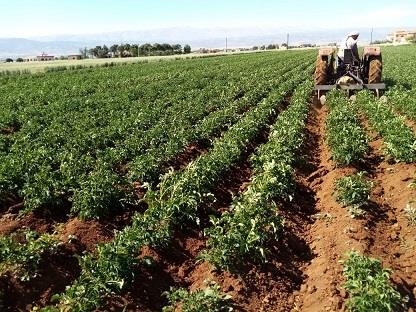Potato farmers in Baalbek shifting to a more environmentally sustainable and economically feasible approach to growing potatoes

The rapidly deteriorating economic and financial crisis seriously affects agriculture in Lebanon. As most agricultural inputs (agro-chemicals, seeds, animal feed, vaccines and other veterinary supplies, etc.) are imported, the productive capacities of the farmers have been particularly affected by increasing input costs resulting from the rapid devaluation of the Lebanese Pound in the parallel market and the disruption in imports.
Managing plant pests and diseases and plant nutrition in Lebanon has always been highly dependent on the use of chemical pesticides and fertilizers. Most of the farmers believe that increasing the quantity of chemical fertilizers will increase the yields of their crops.
However, with the support of the project “Prevention of Agrochemical Pollution in the Upper Litani River Basin” implemented by the Food and Agriculture Organization of the United Nations (FAO) in collaboration with the Ministry of Agriculture and funded by Norway, 42 potato farmers from Baalbek decreased their use of chemical fertilizers by up to 50 percent and pesticides by up to 60 percent in their potato fields during the early potato season 2021 (March-July 2021). The FAO project aims at reducing agrochemical pollution of surface and groundwater in the Upper Litani basin through the promotion and application of Integrated Crop Management (ICM) practices.
Potato farmers are now convinced that using less chemical fertilizers and pesticides is possible without any decline in potato yield.
Mostapha Kheireddine, a potato farmer from Baalbek benefited from a reduction of 100 kg of fertilizers per dunum, a reduction of USD 130 in the cost of production per dunum due to the reduction in quantities of chemical fertilizers and pesticides used. Mostapha is confident of his work. “With the support of FAO and MoA teams, we now know how much water to add to the crops, how to test the soil. We are now more experienced.” He added “This year I only sprayed chemical pesticides once. I used to spray my land twice per year. Next year I am not spraying chemicals pesticides at all!”
With the escalating price of fertilizers in the country, farmers are now more convinced than ever in using less agrochemicals and preserving water.
Farmers like Ali, who benefitted from USD 130 and 100 KG fertilizers per dunum, want to apply ICM practices to other crops like grapes, which they usually plant in parallel with potatoes.
The Norway-funded FAO project established numerous potato pilot plots to compare farmers’ traditional practices with integrated crop management (ICM) practices. In every plot, two fields are planted side by side; s, and one by a project facilitator, using project validated ICM practices. Throughout the potato-growing season, the plot facilitator follows the crop development and makes necessary changes at the level of irrigation, pest management and crop nutrition as needed. The facilitator keeps a record of all interventions made in both farmer and ICM plots, including quantities and types of pesticides and fertilizers used. At the end of the growing season, the yield of each field (farmer and ICM) is obtained and a comparison table is drawn. The results of the completed potato comparative pilot plots have proven that it is feasible to reduce the use of chemical fertilizers by an average of 50 percent and at least 60 percent reduction in pesticide sprays compared to traditional old habits acquired from elderly farmers while maintaining the same productivity. Farmers invited to field days to witness the results directly in the field have shown encouraging interest to reduce the use of chemical fertilizers and pesticides.
“I would like to thank FAO and MoA in particular this year, said Abou Nazih, with the multiple crises we are facing in the country in addition to the COVID-19 repercussions on the agriculture sector, we barely managed to buy fertilizers, but we made it by following the instructions of the project team.
When applying ICM practices, farmers now have an alternative source of reliable agricultural extension technical information from the project’s facilitators (trained MoA’s technical extension staff) and FAO’s project technical team.
